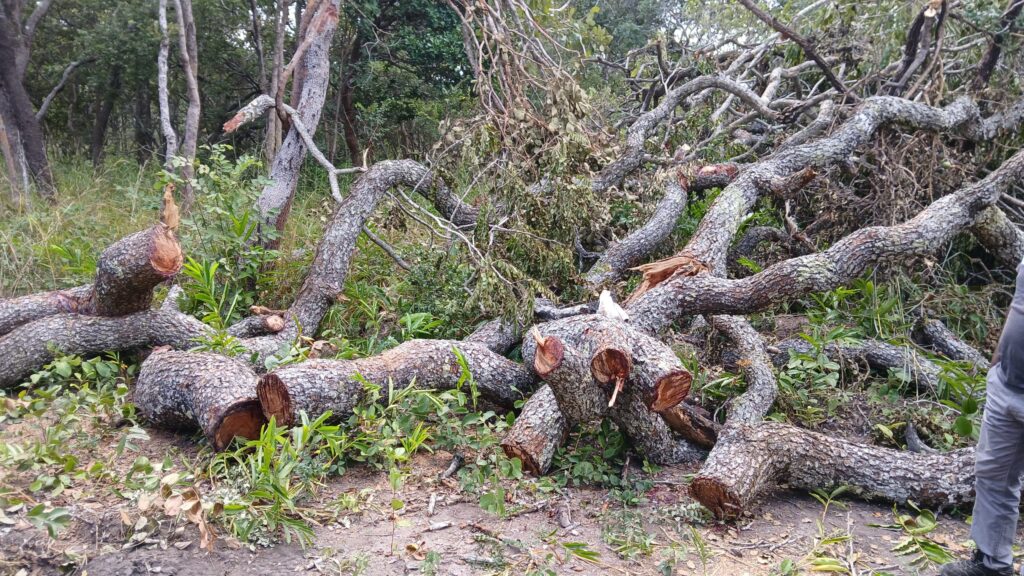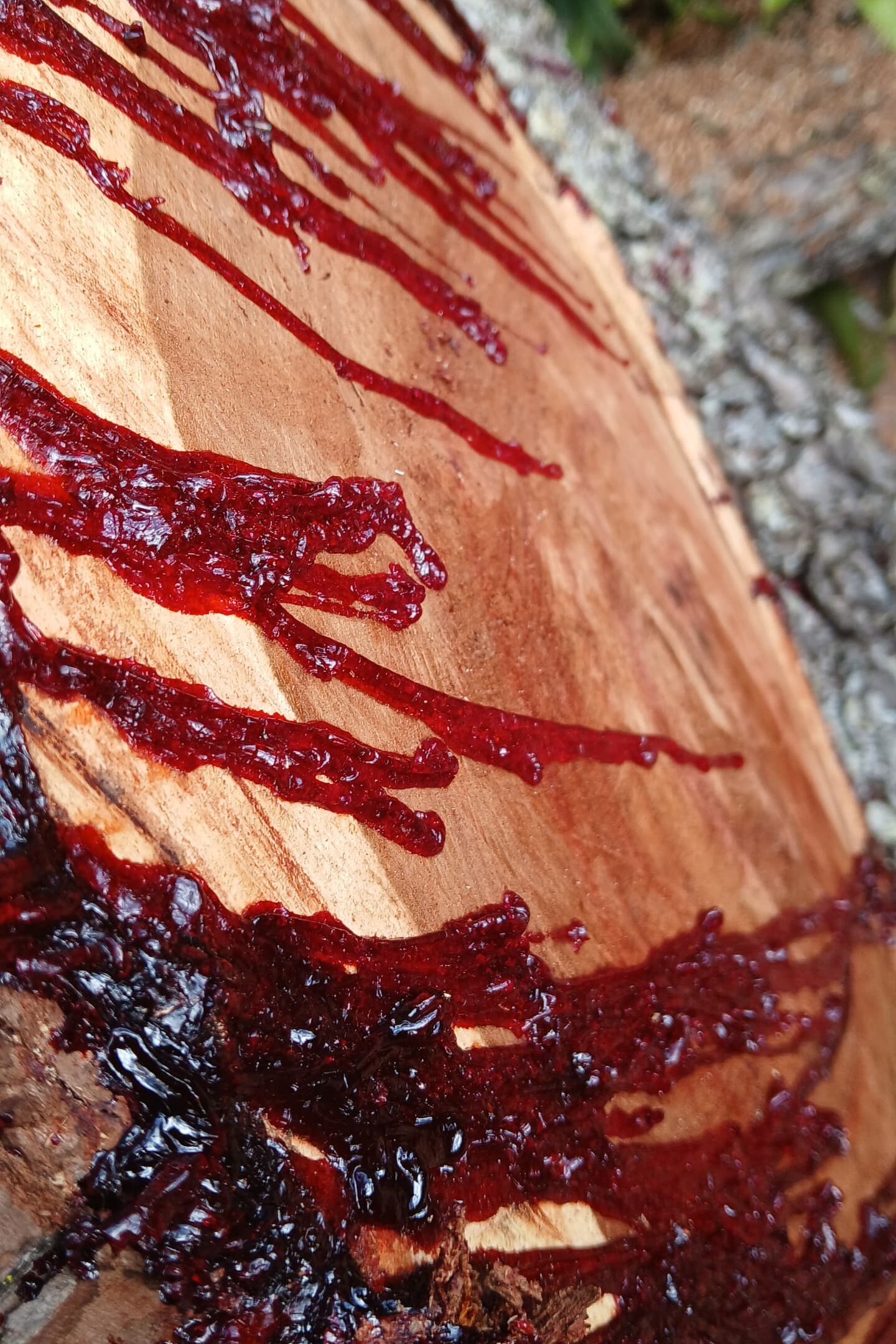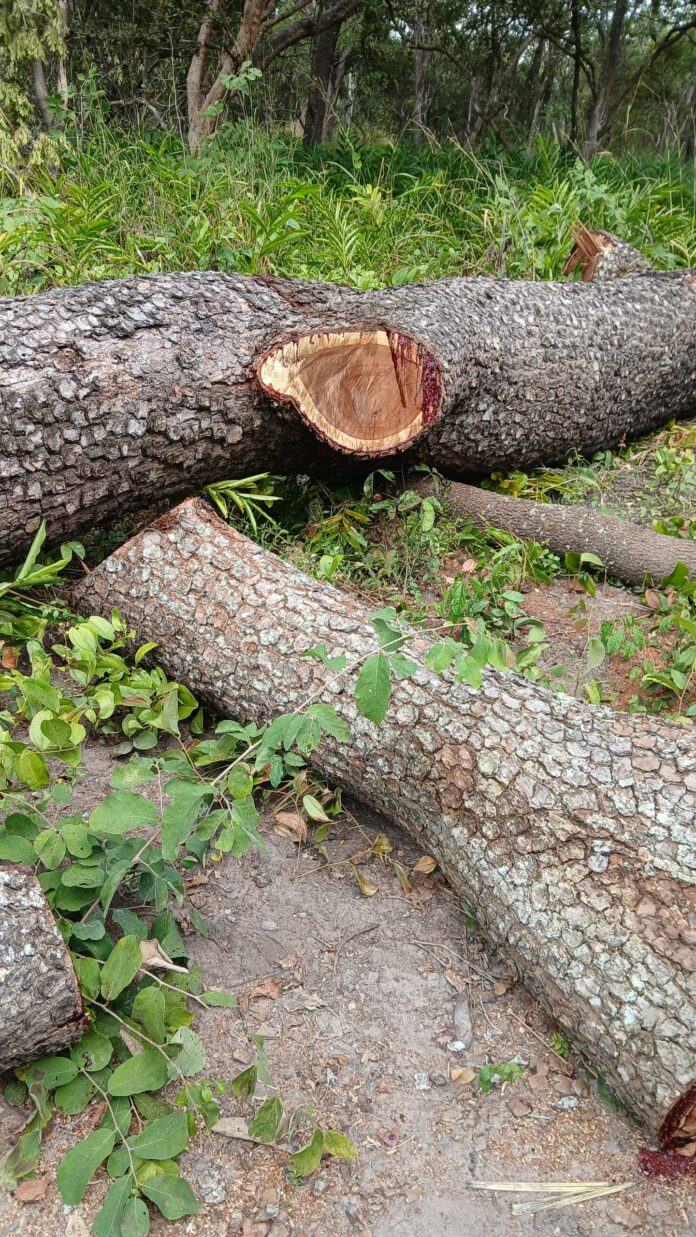By Ennety Munshya | MakanDay Investigates
There are no active concession licences in place—yet timber continues to flow.
The MakanDay Centre for Investigative Journalism has found that ongoing systemic illegal logging in Serenje and Chitambo Districts is fueled by weak law enforcement, the involvement of traditional leaders, and strong external demand—particularly from China.
MakanDay has also found that both national and local forests, including game management areas (GMAs), are under threat from illegal loggers who continue to harvest timber unlawfully.
Chiefs and headmen accused of authorising illegal logging.
At the centre of this activity are traditional leaders, who are allegedly issuing permits to the illegal loggers.
In September 2022, the Ministry of Green Economy and Environment announced it had issued 190 timber concession licences in the small and medium-scale categories countrywide, out of 483 applications received.
According to the September 26, 2022 edition of the Times of Zambia, two licences were granted in Serenje District, under Chieftainess Serenje’s area—to Leviticus 365 Limited and Zelime Ventures Limited. In neighbouring Chitambo District, one licence was issued to A.A Squares Wood Limited for operations in the Musangashi community forest.

PACRA search reveals missing records for approved timber operators.
However, a PACRA search conducted by MakanDay found no registration records for any of the three companies, raising serious questions about how timber concession licences were issued to entities that are not officially registered.
According to Statutory Instrument No. 50 of 2016, the director is required to advertise potential concession areas before citizens can apply for licences.
Applications must include a consent letter from the local chief and authority. The Zambia Environmental Management Agency (Zema) then issues a decision letter after reviewing the applicants’ environmental project briefs, which detail their forest management and regeneration plans.
The decision letter from Zema also specifies which tree species are approved for harvesting.
Key agencies fail to respond to questions about enforcement.
MakanDay requested information from Zema to determine whether systems are in place to monitor forested areas and ensure that logging activities are legal and sustainable. The agency has yet to respond.
MakanDay has found that concession licences issued in September 2022 for Serenje and Chitambo under the small-scale category expired early this year, with no renewals from the concessionaires.
A well-placed anonymous source from the forestry department revealed that illegal timber harvesting is ongoing in nearly all chiefdoms across both Serenje and Chitambo districts.
Asked how the illegal logging occurs, the source said that most illegal loggers come from outside the two districts, with some travelling from as far as Lusaka and surrounding areas. They typically approach traditional leaders—including chiefs, sub-chiefs, and senior headmen—to gain permission for illegal logging activities.
MakanDay interviewed several Community Forest Management Groups (CFMGs), who said they are struggling to carry out their duties due to poor relations with traditional leadership.
CFMGs play a central role in managing and protecting forests on behalf of local communities under Zambia’s Forests Act No. 4 of 2015. These legally recognised groups work closely with the Department of Forestry to promote sustainable forest use.
All community forests in Chitambo District fall under Chief Chitambo’s jurisdiction. One CFMG chairperson said that in March this year, he encountered four illegal loggers from Mpulungu, a district in Northern Province, who claimed to have a licence but were unable to produce it. He added that the loggers also presented a written and signed note allegedly from Chief Chitambo authorising them to cut trees in the Musangashi Community Forest.
“They came with a written note and it was signed by Chief Chitambo. I refused to allow them and told them that we do not allow cutting down of trees in the Musanganshi Forest. They said they got permission from the chief and had a licence, but they could not produce their licence,” he explained.
He said when he reported them to the Department of Forestry in the district, the officer he spoke to responded casually and told him to “sort it out himself”.
He cited a general lack of support from the department in addressing environmental crimes such as illegal logging.
“They usually pay some money to the Chilolos [senior headmen] and the chiefs to be allowed to cut down trees,” he alleged.
Another member of the CFMG told MakanDay that chiefs often direct their Chilolos to grant illegal loggers permission to harvest timber from local forests.
“Sometimes the chief is aware of these activities, and sometimes he isn’t—because his headmen act independently,” he said.
Community groups say chiefs view them as enemies, not allies.
He added that CFMGs are struggling to fulfil their mandate because Chief Chitambo believes they are working against him.
“I once saw some Indians cutting trees that were being transported to a nearby mine in Mkando, which is also owned by Indians,” he said.
“The chief has openly told us he doesn’t recognise us as CFMGs. He sees us as a threat.”
A chairperson of a Community Resource Board (CRBs) also told MakanDay that in some cases, farm owners themselves permit illegal logging on their land.
“When we confront them, they tell us the land is theirs and that we have no authority to stop them—because they’ve already paid the traditional leadership for the right to be there,” she said.
She explained that in such cases, no cash changes hands. Instead, the illegal loggers give the landowner one or two logs from the harvest.
“These farmers often don’t have the equipment to cut the trees themselves. So when approached by loggers, they agree to let the trees go in exchange for a few logs, which they later use to build houses, boats, or coffins. But they’re not paid anything.”
CRBs are legally recognised under the Zambia Wildlife Act No. 14 of 2015 and work in partnership with the Department of National Parks and Wildlife (DNPW) to co-manage wildlife and natural resources, especially in Game Management Areas (GMAs).
Chief Chitambo Silent Amid Allegations of Involvement in Illegal Logging
Chief Chitambo of Chitambo District has not responded to allegations linking traditional leaders to illegal logging activities. Multiple phone calls and text messages from MakanDay seeking comment went unanswered.
A Department of Forestry official, speaking on condition of anonymity, confirmed that illegal logging is widespread in the region, with some valuable tree species—such as the once-abundant Mukula—now nearly depleted in Serenje District.
Illegal loggers are now shifting focus to other high-value species including Mukwa, Saninga, Mutondo, Musamba, Umuputu, Mubanga, and Kaimbi, in addition to the Mukula, which is currently listed as a protected species.
This rampant illegal activity is not only devastating community forests, but is also encroaching into protected zones such as Game Management Areas (GMAs).

Hundreds of planks seized, but few cases make it to court.
In early 2025, MakanDay received credible reports of more than 300 planks of timber being illegally harvested in the Kafinda GMA. Although the case was initially reported and a docket opened, sources allege that an instruction from unnamed authority led to its quiet withdrawal.
In a separate incident, over 200 planks of illegally harvested timber were confiscated in the Chisomo GMA and handed over to the Department of Forestry.
So far, only three cases of illegal timber harvesting have resulted in convictions this year, according to officials.
The Forestry Department under the Ministry of Green Economy and Environment is responsible for overseeing the issuance of licences, as well as regulating fees for timber concessions, production, sawmilling, and export operations.
However, the scale of the problem remains staggering. According to the World Bank’s 2019 Zambia Country Forest Note, approximately 70 percent of the country’s total log production is exported—90 percent of which is believed to be harvested without valid licences.
“Domestic demand is driven by the construction, furniture, and carpentry sectors. The construction sector consumes the lion’s share—about 40 percent—of all non-fuel timber (logs, sawn wood, and poles). Only 20 percent of this volume comes from plantations; the rest is sourced from natural forests,” the report states.
Despite attempts to seek comment, the Ministry of Green Economy and Environment—through Principal Public Relations Officer Harriet Chimuka—has not yet responded to MakanDay’s formal request regarding illegal timber harvesting.
EIA data reveals 99% of Zambia’s timber exports went to China.
Although Zambia has made strides in promoting sustainable forest management through legislative tools such as the Forest Act, the country’s timber trade remains deeply entangled in illegality, particularly concerning exports to China.
A 2021 Environmental Investigation Agency (EIA) report reveals the extent of the crisis: between 2010 and 2017, Zambia’s log exports increased by over 6,000 percent, with China alone accounting for 99 percent of the exports—highlighting the overwhelming dominance of a single foreign market on the country’s forestry sector.
Experts say this surge in trade has been enabled by governance gaps and murky licencing procedures, especially in rural and customary land areas. Under Zambia’s Forest Act, local communities can legally clear forested land for agriculture or other uses without needing a licence. But if the timber is sold, a valid harvest or sawmill licence is required—a regulation that is often ignored and poorly enforced.
Environmental defenders say forests can’t survive this pace of destruction.
The Centre for Zero Waste and Development in Africa (CZWDA) has described illegal logging as a serious national issue, emphasising that it extends beyond Serenje and Chitambo Districts to other parts of the country.
Executive Director Billy Lombe expressed concern that while Zambia has strong laws and policies in place to protect forests, enforcement remains weak and institutions lack the capacity to implement them effectively.
CZWDA, a non-governmental organisation, promotes environmental justice, sustainable forest management, and zero-waste practices. It advocates for policy reform, monitors environmental violations, and supports sustainable alternatives to deforestation.
Serenje-based environmental activist Kalika Phiri echoed these concerns, warning of the escalating crisis.
“Encroachment into national and community forests is happening at an alarming scale,” said Phiri. “Illegal logging continues unchecked despite the existence of laws meant to protect these ecosystems.”

Discover more from MAKANDAY
Subscribe to get the latest posts sent to your email.



